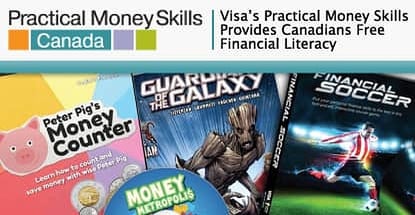In a Nutshell: Taking advantage of modern technology, popular credit card network, Visa, is working to make learning about money more accessible and interactive. With its Practical Money Skills program, Visa offers a range of financial education resources designed to motivate and inspire, from adult-geared guides and tools for key topics, including budgeting and mortgages, to its child-friendly comics and video games, like FIFA World Cup™ Financial Soccer and Peter Pig’s Money Counter. The program, available across the globe, is empowering educators with classroom materials that help teachers spread financial literacy lessons in every corner of the world. //
Traditional financial education may cause some children to roll their eyes, but learning about money doesn’t have to be boring for kids — or adults. For instance, when visitors play FIFA World Cup™ Financial Soccer, they answer questions on topics like savings, credit, budgeting, and pitfalls, and each correct answer allows them to advance the ball down a virtual soccer pitch. And the more answers they get right, the better they’ll fare against computerized opponents.
When I played Financial Soccer, I shut out Bosnia-Herzegovina, three goals to nil. My victory was helped by the “pre-game” prep, readings and quizzes on the four above-listed topics. And during the game, I could select the difficulty level of the questions I wanted to answer, which corresponded to how far the ball would be passed if I was correct. When I answered incorrectly, the ball was stolen by my opponent.
If this sounds like the right combination of entertaining and enlightening, then Visa has scored its goal. Financial Soccer is the most popular program offered by Visa’s Practical Money Skills program, an initiative to help people of all ages — but adolescents, in particular — learn about important financial issues.

Visa’s financial literacy program is available in multiple languages and in virtually every corner of the world. We recently spoke with Hugh Norton, Visa’s Head of US Financial Literacy, about the program’s Canadian offerings, particularly regarding debt and credit resources, and how this information is helping educate and motivate Canadian consumers to build healthier financial lives.
“Visa understands that teaching students about money through ‘edutainment’ or ‘gamification’ can be an effective way to make what may be perceived as a dull subject, exciting both in classrooms and at home,” Hugh explained. “By utilizing familiar and compelling mediums — video games, comics, and apps — Visa enables individuals of all ages to learn while having fun.”
Financial ‘Edutainment’ Makes Learning About Money Fun for Canada’s Youth
Just as having a piggy bank might be a child’s first contact with real money, a fictional character named Peter Pig is teaching children between the ages of 5 and 8 their first financial lessons, in a game called Peter Pig’s Money Counter.
In the game, kids identify, count, and save money, while exploring a world that tests out their newfound currency skills with interactive budgeting tasks. They can then choose to save or spend their earnings in a virtual store replete with items for Peter Pig. The game also includes fun facts about money, tips for saving, and rewards for children who save.
Another popular tool for kids is a comic book series, with beautiful art and narratives that teach lessons on personal finance. Visa teamed up with Marvel Comics to release two such publications, Avengers Saving the Day and Guardians of the Galaxy: Rocket’s Powerful Plan, the latter of which will be available in 16 languages.

“Guardians of the Galaxy: Rocket’s Powerful Plan” weaves financial literacy into the comic book’s narrative.
Other interactive games include Road Trip to Savings, in which players embark on a four-week road trip, making decisions along the way on how to make, spend, and save money; Ed’s Bank, in which players help Ed put money in his piggy bank to be used for future purchases; and Money Metropolis, in which players choose various ways to make money, which is then put toward purchase goals.
The program also provides calculators for students, personal finance articles, and brochures that cover the basics of budgeting, building credit history, and educating students on financial responsibility.
It’s Never Too Late: Helpful Money Guides & Tools for Adults
Going beyond resources for kids, the Practical Money Skills program also aims to educate adults, providing resources applicable to Canadians of all ages. The website hosts several personal finance guides, including a practical money guide, as well as specific guides on credit cards, debit cards, prepaid cards, budgeting, and identity theft.
Each guide includes the fundamental aspects of the topic that everyone should know. For example, the brochure on credit history covers the basics of what comprises credit history, who can see your credit report, how to keep your credit score strong, and how to correct credit report errors.
To make navigation simple, the website has a separate section for financially relevant issues, organized by life events at various stages, such as marriage, divorce, parenting, and elder care. The parenting section, for instance, has an informational sheet that covers the costs of parenting, including the things new parents (or future parents) should budget for, from infancy onward.
Even more hands-on are the site’s interactive tools. Users can find a selection of helpful calculators perfect to help crunch the numbers for saving for a goal or reworking your budget. Visitors can also use calculators specially designed for more specific life events, such as budgeting for a baby or planning for back to school.

The Practical Money Skills program provides a series of helpful calculators and guides for adults.
Additionally, Visa has a team of financial experts that regularly weigh in on a range of popular topics through posts to its Practical Money Matters blog. A recent article, “Planning That Affordable Holiday Trip,” offers several tips for traveling on the cheap, such as finding cheaper accommodations (by researching special rates or traveling in non-peak seasons), using mileage points, and packing lightly to avoid additional baggage fees. Some other recent articles cover topics like “Sporting Events on a Budget” and “How to Tackle Your Grocery Bill.”
The ‘Choices & Decisions’ Program Helps Thousands Build Hands-On Experience
Knowing teachers are often tremendously influential in helping children develop sound financial skills, the Money Skills Program empowers educators with programs for the classroom. Teachers can find lesson plans, activity worksheets, and pre-made quizzes. Many of these programs are geared toward students in high school and college, and include forward-looking subjects such as creating short- and long-term personal financial goals, a personal budget, savings and investing, and the basics of banking services.
Launched in 2009, Practical Money Skills’ popular in-class resource program, Choices & Decisions: Taking Charge of Your Financial Life, provides lesson plans containing goals, objectives, timelines, teacher notes and instructions, and evaluations. Each of the 15 lessons gives teachers information and guidance on how to help their students develop better money management skills, as well as planning for financial milestones such as attending college, moving out of their parents’ house, or buying a car.
Hugh said the program, which has been featured at Financial Consumer Agency of Canada (FCAC) events, “has been used by thousands of educators and students. This program is designed to teach young people how to set long- and short-term personal and financial goals; create and work with a personal budget; identify how and when to use credit; save and invest; understand the basics of banking services; and develop character and confidence.”
Hugh added that the program has been widely embraced by the community at large. Examples include the Junior Economic Club of Canada’s “Day on Bay” events with high school students, which featured Financial Soccer.
“Visa Canada also sponsored the Junior Economic Club’s North Meets South Exchange Summer Camp, where students travelled together to Iqaluit, Nunavut, and then to Toronto, Ontario, for a hands-on program designed to equip them with business, entrepreneurial, personal finance, and critical thinking skills,” Hugh said.
By getting hands on in promoting financial literacy through games, educational resources, and community outreach, Visa is doing its part to create more financially savvy consumers in Canada and beyond.
Advertiser Disclosure
CardRates.com is a free online resource that offers valuable content and comparison services to users. To keep this resource 100% free, we receive compensation for referrals for many of the offers listed on the site. Along with key review factors, this compensation may impact how and where products appear across CardRates.com (including, for example, the order in which they appear). CardRates.com does not include the entire universe of available offers. Editorial opinions expressed on the site are strictly our own and are not provided, endorsed, or approved by advertisers.






![9 Ways to Make Money Using Credit Cards ([updated_month_year]) 9 Ways to Make Money Using Credit Cards ([updated_month_year])](https://www.cardrates.com/images/uploads/2021/03/Ways-to-Make-Money-Using-Credit-Cards--1.jpg?width=158&height=120&fit=crop)
![8 Best Money-Back Credit Cards ([updated_month_year]) 8 Best Money-Back Credit Cards ([updated_month_year])](https://www.cardrates.com/images/uploads/2019/04/best-money-back-credit-cards-feat.png?width=158&height=120&fit=crop)

